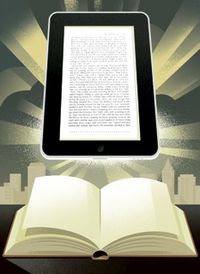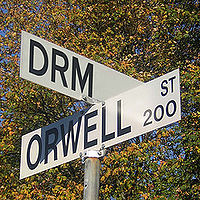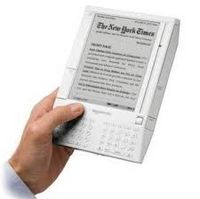Course:LIBR548F/2010WT1/Ebooks
What is an ebook?
Ebooks are most often “digital versions of books that also appear in print. They provide the same content as the print books, but are delivered in a different format” (Littman 256) although increasingly some ebooks are born digital.
E-books come in three main forms:
1) Web based collections of academic and/or public library content.
2) Audio E-Books (thanks mostly to Harry Potter and iPods alone)
3) Downloadable files for portable ebook readers for the retail market such as Kindle, Sony Reader or iPad.

History of the ebook:
Michael Hart is credited with designing the first ebook in 1971 as part of Project Gutenberg. The very first ebook was a digitized copy of the Declaration of Independence. Today, Project Gutenberg [1] houses over 20 000 free texts, and over 100 000 books are available through their partners. Over 3 million books are downloaded each month (History).
Early ebooks were usually stored on floppy disks or hard drives and therefore only available to small select audiences. Because of this, the early ebook market was fractured and lacked consensus about how to package sell or read ebooks (History). Numerous formats emerged – some backed by mainstream software companies (like Adobe’s PDF format), but many independent examples existed, too. Without common technology or format, ebooks remained an esoteric product for some time. Even the emergence of the internet wasn’t enough to bring the ebook mainstream due to the lack of format compatibility.
One of the early genres to embrace the ebook, however, was the romance novel. Already somewhat marginalized as a ‘guilty pleasure’, the romance novel was easily purchased with privacy in e form, and as such quietly became successful when other markets had yet to hear of them (History).
Libraries became interested in ebooks in 1998 when NetLibrary ([2] was formed to sell ebook content to libraries. In 2002, NetLibrary was sold to OCLC, and in 2010 was then sold to EBSCO, who continues to offer content to libraries today amid competition from various other companies and individual publishers. Universities embraced ebooks a little ahead of the curve because faculty were already conducting their research online, and therefore did not need a mobile device to give ebooks a try. Therefore, academic libraries began purchasing ebook content mostly before the general public.
Major publishers finally became interested in ebooks only in this century. At first nervous about the impact ebooks would have on well-established revenue streams and concerned about the lack of control of digital content out in the world, many publishers first tested the new medium by re-purposing backlist content without risking frontlist sales. When this often gave new life to old titles, publishers eventually saw potential for newer content, and are even starting to publish e and p simultaneously (Rosy). While ebooks continue to lag behind print books in numbers of publications, nevertheless, ebooks are now making big gains in the library, academic and retail markets.
Oprah Winfrey gave ebooks a significant boost in popularity when she declared that the Amazon Kindle [3] ebook reader was her “favorite gadget” in 2008 (Gonsalves). Sony Reader [4], iPad [5], and Kobo [6]are some of the other best known ebook readers in the market today, although dozens more exist. Issues of technical compatibility, Digital Rights Management and format continue to plague this device even with its recent popularity, and there is still a sense that the ebook reader market has yet to stabilize. Nevertheless, the popularity of ebooks[[[7]]] can no longer denied as Amazon announced in July 2010 that it is selling more ebooks than hardcovers (far less that paperbacks, but still) (Fister).
A major setback for ebooks occurred in 2009 when Amazon “remotely deleted some digital editions of the books from the Kindle devices of readers who had bought them” because of a rights issue for the content (Stone). Ironically, the book in question was George Orwell’s 1984, which only reinforced for some how little control users have of their own digital content.
Another significant development in the ebook world is the Google Books [8] project. While in some ways a different entity, Google is digitizing print content and making the full text searchable on Google. In many ways, this is to promote the print copy, but Google will make its “first foray into the direct-to-customer marketplace with digital books” (Abram) in 2010 which will put them in direct competition with Amazon’s Kindle and Apple’s iPad.
Digital Rights Management

Another issue that plagues the further expansion of ebooks in the marketplace is Digital Rights Management (DRM). DRM refers to “access control technologies that can be used by hardware manufacturers, publishers, copyright holders and individuals to limit the usage of digital content and devices” (Wikipedia).
Proponents (publishers, content providers) argue “it is needed by copyright holders to prevent unauthorized duplication of their work, either to maintain artistic integrity or to ensure continued revenue streams” (Wikipedia) while many end users feel the restrictions are unfair and restrict the use of material in ways that are “beyond the scope of existing copyright laws” (Wikipedia). This is a critical issue for ebook content providers and legislators to determine moving forward if the ebook market is to stabilize.
Where to obtain ebooks?

Individuals can purchase ebooks for use on their mobile reading device via:
- Amazon
- Apple
- Chapters
- Barnes & Noble
- Safari Books
- Google (coming soon)
Libraries can purchase from a third party aggregators/distributors, including:
- Ebrary
- MyiLibrary
- Netlibrary
- EBL
- EBSCO
- Books 24X7
- Library to Go
- Library To Go (fiction and non-fiction
== References: ==
Abram, Stephen. "Ebooks Part 2: Trends and Standards." MultiMedia & Internet@Schools. 17.4. (2010): 24-27. Web. 24 September, 2010.
Auletta, Ken. “Publish or Perish: Can the iPad topple the Kindle, and save the book business? The New Yorker. The New Yorker. 26 April 2010. Web. 24 September, 2010.
“Digital Rights Management." Wikipedia: The Free Encyclopedia. Wikimedia Foundation, Inc. 24 September 2010. Web. 24 September, 2010.
Fister, Barbara. “Ebooks and the Revitalization of Research.” Library Journal. 135.13. (2010): 24-25. Web. 24 September, 2010.
Gonsalves, Antone. “Oprah Endorses Amazon.com's Kindle.” Information Week. Information Week. 24 October, 2008. Web. 23 September, 2010.
“History of Ebooks.” ebookweek.com. Read an Ebook. n.d. Web. 22 September, 2010.
Littman, Justin, and Lynn Silipigni Connaway. “A Circulation Analysis of Print Books and E-Books in an Academic Research Library.” Library Resources and Technical Services. 48.4 (2004) 256-262.
Rosy, Rich. Personal Interview. 20 September, 2010.
Stone, Brad. “Amazon Erases Orwell Books From Kindle.” New York Times. New York Times. 18 July, 2009. Web. 23, Sept, 2010.